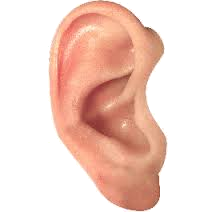Listening Games And Activities
Lesson Plans > Language Arts > Listening SkillsListening Games And Activities

"Hey mom; I think I'm going to drop out of school!"
"Ok hon. Just don't forget that dinner is at seven tonight."
Doesn't this sound familiar to you? Don't we all do this at one time or another? We hear! We hear the voice! We hear the sound! But are we really listening?
This is one of my greatest concerns about education. I believe that if you know how to listen, school and life, will be easier to handle. The following are some suggestions I would like to share with you on this topic.
Listening skills are learned. They should not however be learned haphazardly. There should be a planned program to increase listening skill abilities, and it should be a significant part of elementary education.
Listening is basic for communicating, learning, thinking and acquiring awareness of the world around you.
Listening needs to be taught.
Listening requires participation.
Listening is an information-processing activity.
Listening is more than just hearing; it's deciding what we listen to and how this can be done most effectively.
Listening requires an active effort on the part of the student. It trains the child to select, remember and process sounds.
Let us keep in mind that this is not necessarily every child's preferred channel of learning. Some children learn better through visual means or kinesthetic ones. Still, listening is an important skill and needs to be taught. This skill can be accomplished very simply by planning and dedicating no more than 5 minutes on a daily basis.
Listening Games And Activities
We should work on:
a) Sound discrimination: what sounds are the same, different
b) Awareness of sounds: what sounds are heard in various situations
c) Recognition of sounds: which of these sounds is like buzz? hum? click?
d) Identification of sounds: name this sound. Name of item making sound or letter sound
e) Sound concepts: high or low? Loud or soft? Near or far?
Following are some suggestions of games and activities to do based on these listening skills:
1. Close your eyes and listen to the sounds heard in one minute. (b)
2. Recognize well-known sounds - like the ones we hear at home. For this activity you will need a tape with different sounds such as a tap running, flushing the toilette, vacuum cleaner, etc. (b)
3. Discriminate high and low sounds. (with voice, or musical instruments) (a)
4. Match sounds. Fill small identical containers with rice, sand, nails, beans, cotton batting, etc. Make sure you have a pair. Shake them, find the two that sound the same. (a)
5. Discover where a sound originates from. (close your eyes and listen carefully. "Where is it coming from and where is it going?" (e)
6. Guessing by the sound what food is being eaten. Use noisy foods, like potato chips, celery sticks, carrots, toast, etc. The children have to guess what it is. (d)
7. Use paper, tin sheet, aluminum foil, or any substance that comes in sheets; produce sounds in various ways: by crinkling, rubbing, tearing, waving, shredding, wrapping, scratching, etc. One child does the action, the rest with eyes closed, have to guess how the sound was made. Practice the vocabulary beforehand. (d)
8. Listen to the sound that common appliances make. Invent a word that names the sound. As an added activity, children name the appliance together with the sound they invented. "The car goes _________." (c, d)
9. Look at a picture (e.g. a park) then think of the sounds that you would hear if you were there. Make the sounds and record them. Play the tape another day and let the children guess what is making that noise. (When using it as an activity for an ESL classroom, the next step would be to learn the proper vocabulary: footsteps, car honking, etc.) (c, d)
10. Say a word. Next one says a word beginning with the last letter. (Cat, top, pan, nail, leg, etc.) (d)
11. A similar game can be played by using the letters in a child's name. (Carol: cat, arm, rock, oil, laugh) (d)
12. Finish the sentence with a word beginning with the same letter as the others. (Silly Sally saw seven ... swings) (d)
